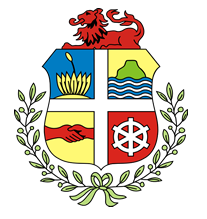Aruba: Government
Key Figures
- Chief of State:
- King Willem-Alexander of the Netherlands represented by Governor Alfonso Boekhoudt
- Head of Government:
- Prime Minister Evelyn Wever-Croes
Overview
- Government Name:
- Aruba
- Constitution:
- Adopted: 1986; Provides for a government to oversee the commonwealth's local government, an elected prime minister to head the local government, and delegates the legislative, executive, and judicial powers to the parliament.
- Government Type:
- Parliamentary Democracy

Index of Economic Freedom
Country Risk Rating
Government Branches
| Main Powers | Election Process | Election Cycle 1 | |
|---|---|---|---|
| Executive | The king has a ceremonial role. The governor-general represents and guards the general interests of the kingdom and is head of the Aruban government. The prime minister also helps to head the government and serves as the council of ministers. |
The king is hereditary. The governor-general is appointed by the monarch. The prime minister is elected by parliament. |
Governor-General: 6 years; Prime Minister: 4 years |
| Judicial | The "Common Court of Justice of Aruba, Curaçao, Sint Maarten, and of Bonaire, Sint Eustatius and Saba" primarily hears appeals from lower courts on these six islands, and is on the same level as similar courts in the Netherlands. The supreme court of the Netherlands is the highest court of Aruba jurisdiction and is limited primarily to civil, criminal, and tax-related cases. |
Justices of the supreme court and common court are appointed by royal decree, from a list of three, advised by the house of representatives on the advice of the Hoge Raad itself. |
Supreme Court: retirement at age of 70; Common Court: retirement at age 65 |
| Legislative | The Estates of Aruba are responsible for the creation of laws in Aruba. Aruba has a multi-party system which means that there are two or three strong political parties and a third party that is electorally successful in current office. |
21 members elected through an open-list proportional representation system. |
4 years |
Regional Trade Blocs
No Regional Trade BlocsInternational Organization Participation [2]
Environmental Agreements [3]
Tax Information [2]
- Tax Authority:
- Ministry of Finance
- Tax Name:
- Income Tax
Sources:
- ElectionGuide http://www.electionguide.org/
- EY, http://www.ey.com
- CIA World Factbook, https://www.cia.gov/the-world-factbook/
- U.S. Bilateral Relations Fact Sheets http://www.state.gov/r/pa/ei/bgn/


